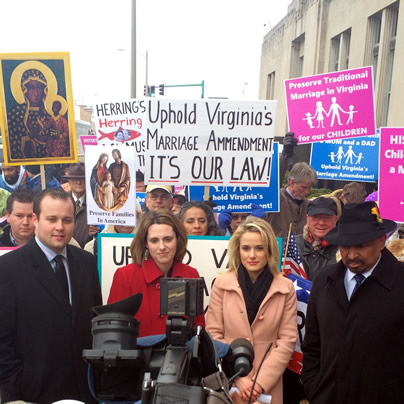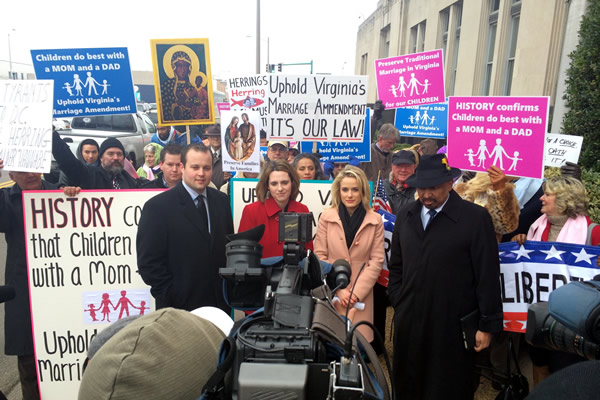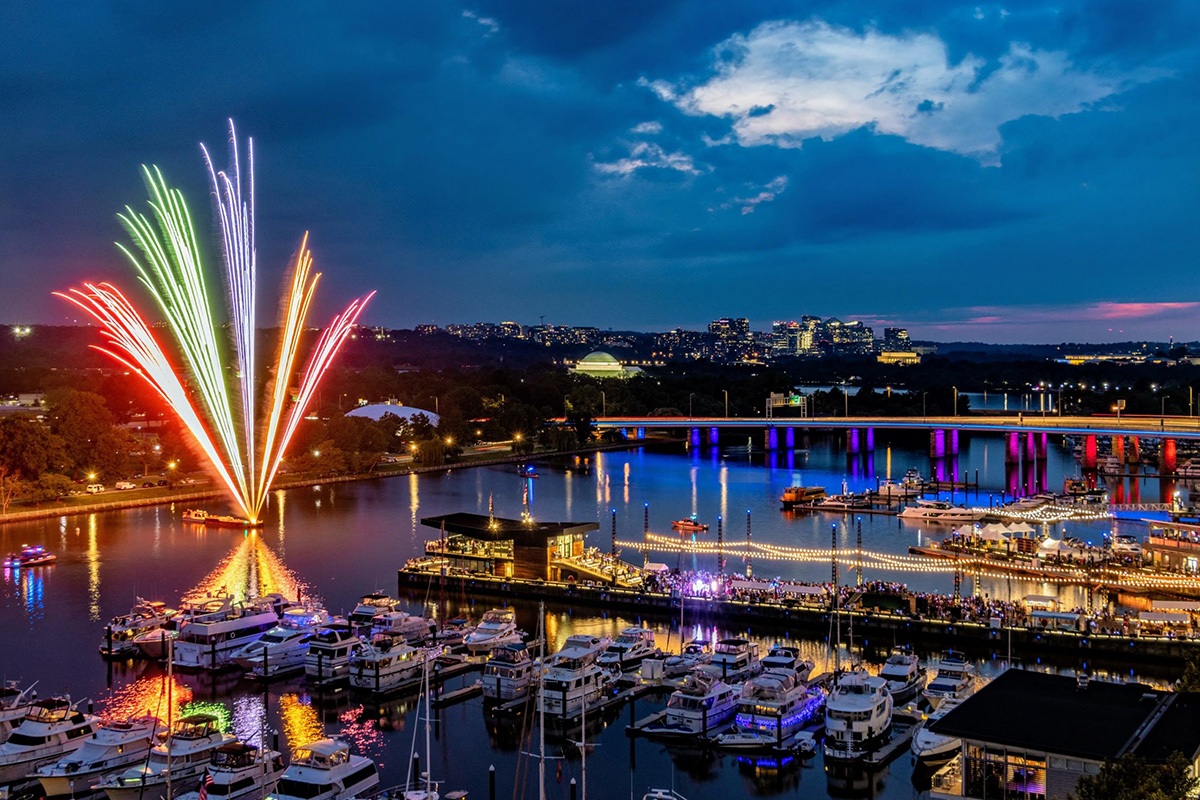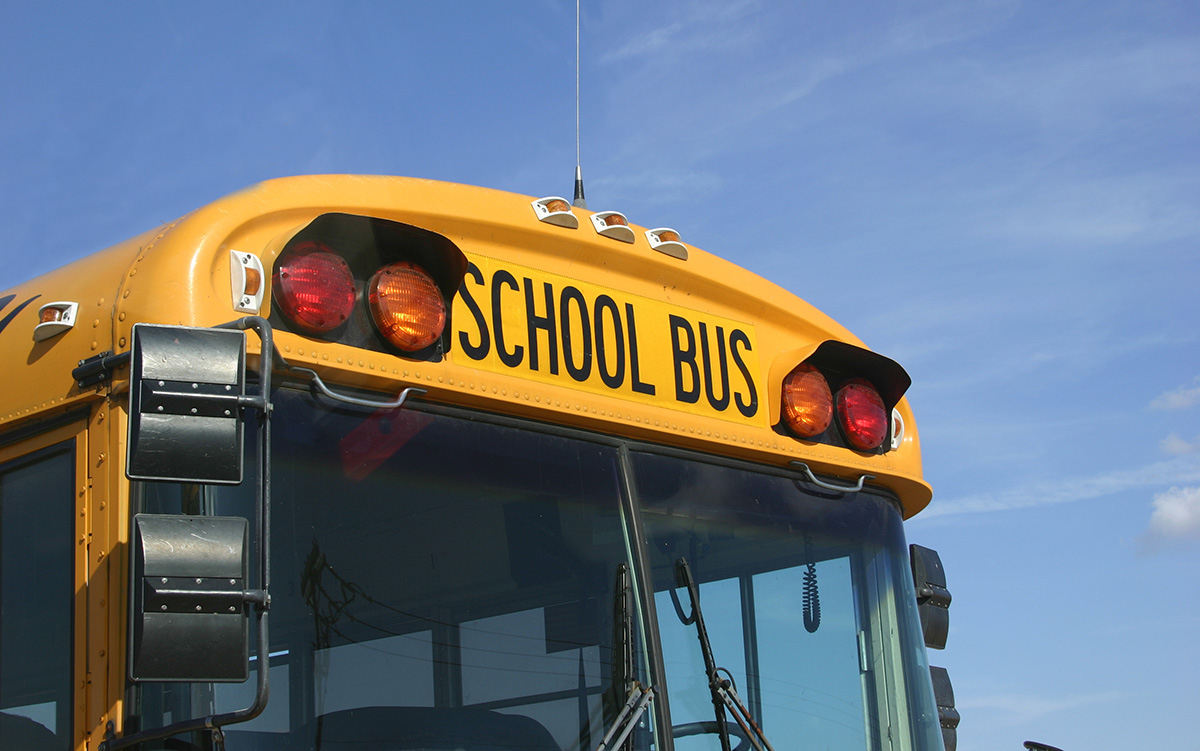Local
Lawyer: Va. marriage ban necessary for ‘procreation’
Anti-gay Alliance Defending Freedom files brief with federal appeals court


A lawyer with the Alliance Defending Freedom argues in a brief submitted to the 4th U.S. Circuit Court of Appeals that Virginia’s same-sex marriage ban is necessary for “procreation.” (Photo courtesy of the Family Foundation of Virginia)
A lawyer for an anti-gay legal group said in a brief filed with a federal appeals court on March 28 that Virginia’s same-sex marriage ban is necessary for the “procreation” of children.
“Redefining marriage harms marriage’s ability to serve those interests by serving marriage’s inherent connection to procreation and communicating that the primary end of marriage laws is to affirm adult desires rather than serve children’s needs, and suppressing the importance of both mothers and fathers to children’s development,” wrote Byron J. Babione of the Alliance Defending Freedom in a brief he filed with the 4th U.S. Circuit Court of Appeals in Richmond, Va., on behalf of Prince William County Circuit Court Clerk Michèle McQuigg.
Babione argued that U.S. District Judge Arenda L. Wright Allen “sought to discredit these procreation- and child-focused purposes for marriage” in her Feb. 13 ruling that struck down Virginia’s constitutional amendment that defines marriage as between a man and a woman.
“Plaintiffs ask this court to use the law’s power to redefine the institution of marriage,” said Babione. “That redefinition would transform marriage in the public consciousness from a gendered to a genderless institution – a conversation that would be swift and unalterable, the gendered institution having been declared unconstitutional.”
Babione also cites the Witherspoon Institute in his brief to make the argument that it is “best for a child to be reared by his or her own mother and father.” The New Jersey-based conservative think tank largely funded Mark Regnerus’ study on the issue that a federal judge earlier this month dismissed as “entirely unbelievable and not worthy of serious consideration” in his ruling that struck down Michigan’s same-sex marriage ban.
“Genderless marriage communicates that marriage exists primarily for the government to approve emotional or romantic bonds, because those sorts of bonds (and not sexual conduct of the type that creates children) would be the prominent feature shared by the couples who marry,” said Babione.
David B. Oakley, who represents Norfolk Circuit Court Clerk George Schaefer, III, in the case, said in a separate brief he filed with the federal appeals court on March 28 that Allen “began her opinion with the misconception that Virginia’s definition of marriage is solely based upon prejudice and animus towards gay and lesbian couples.” She opened her ruling with a quote from Mildred Loving, whose challenge of Virginia’s interracial marriage ban prompted the U.S. Supreme Court to issue its landmark Loving v. Virginia decision in 1967.
Oakley further argued Schaefer and others who issue marriage licenses would “face exposure to additional lawsuits” from those denied them if the 4th Circuit upholds Allen’s ruling.
“Same-sex marriage proponents want to open the door of marriage for their benefit and then slam it shut behind them,” wrote Oakley. “It will not be long before other groups come knocking.”
Court records indicate the Family Research Council on March 26 sought to file an amicus brief in the Bostic case, but the federal appeals court blocked it as “premature.” The Washington Blade was unable to immediately obtain a copy of the filing.
Timothy Bostic and Tony London of Norfolk and Carol Schall and Mary Townley of Chesterfield last year challenged the commonwealth’s marriage amendment. The American Civil Liberties Union and Lambda Legal – who filed a separate lawsuit last summer on behalf of Victoria Kidd and Christy Berghoff of Winchester and Joanne Harris and Jessica Duff of Staunton – have been allowed to join the Bostic case.
U.S. District Judge Michael F. Urbanski in January certified the ACLU and Lambda Legal lawsuit as a class action.
The federal appeals court on May 12 is scheduled to hear oral arguments in the Bostic case.
Attorney General Mark Herring earlier this year announced he would not defend Virginia’s marriage amendment that voters in 2006 approved by a 57-43 percent margin.
Briefs from the lawyers who are representing the plaintiffs are due to the court on April 11.
“Our attorneys will review the briefs from the clerks and will respond as appropriate in the brief the commonwealth will file by the April 11 deadline,” Herring spokesperson Michael Kelly told the Blade.
District of Columbia
LGBTQ budget advocates fight for D.C. resources in a tough fiscal year
‘Trying to preserve life-saving services’ amid $1 billion cut

The months and days leading up to June are especially busy for LGBTQ Washingtonians. For one group, the DC LGBT Budget Coalition, which works year-round to ensure LGBTQ residents are represented and financially supported by the D.C. government, this time of year is their Super Bowl. Beginning in April, the D.C. Council and Mayor’s Office hold budget hearings for the next fiscal year.
With D.C.’s budget now under review, the Washington Blade spoke with Heidi Ellis, coordinator of the DC LGBT Budget Coalition, about the group’s top priorities and their push to ensure continued support for queer communities.
“The LGBTQ Budget Coalition was founded in 2020 at the height of the pandemic, as a way for the community to work together to advocate for key funding and policy changes,” Ellis said. “We recognized we were stronger together. A lot of groups are often pitted against each other for resources and dollars. This coalition was founded out of a need for unity. Since then, we’ve successfully advocated for more than $20 million in dedicated LGBTQ investments.”
In addition to coordinating the coalition, Ellis is the founder and CEO of HME Consulting & Advocacy, a firm that helps build coalitions and advance policy initiatives that address intersectional issues in the LGBTQ community. One of its most powerful tools, she explained, is direct outreach through community surveys.
“We actually do community surveys to see what people need and what’s top of mind,” Ellis said. “Of course, we also pay attention to the broader political landscape — like the current threats to HIV funding. That helps us prioritize.”
Because the coalition is comprised of more than 20 organizations across various sectors —healthcare, housing, community organizing — Ellis said its diversity enables it to connect grassroots needs to potential policy solutions.
“Our coalition includes service providers, community groups, health and housing advocates-folks who are deeply plugged into what’s happening on the ground,” she said. “They help determine our direction. We know we don’t represent every queer person in D.C., but our coalition reflects a wide range of identities and experiences.”
The insights gathered through those surveys ultimately inform the coalition’s annual budget proposal, which is submitted to the Council and mayor.
“That’s how we got to our FY26 priorities,” she said. “This year, more than ever, we’re fighting to protect what we’ve already secured — funding and policies we’ve had to fight for in the past. We know there’s concern around this budget.”
One of the challenges this year is that the D.C. government’s operating budget and some of its legislation must be approved by Congress. With a projected decline in tax revenue and a Republican-controlled Congress that has historically opposed LGBTQ funding, the Coalition has had to think strategically.
“Even before the situation on the Hill, the CFO projected lower revenue,” Ellis said. “That meant cuts to social programs were already coming. And now, with the $1 billion slashed from D.C.’s budget due to the continuing resolution, we’re not only fighting for D.C.’s budget and autonomy, but also trying to preserve life-saving services. Our message is simple: Don’t forget about queer people.”
This year’s proposal doesn’t include specific dollar figures. Instead, the Coalition outlines five funding priority areas: Healthcare, Employment & Economic Equity, Housing, Safety & Community Support, and Civil Rights.
Why no exact amounts? Ellis said it’s because not all solutions are financial.
“Some of our asks don’t require new funding. Others build on existing programs-we’re asking whether the current use of funds is the most effective. We’re also proposing policy changes that wouldn’t cost extra but could make a real difference. It’s about using what we have better,” she said.
When drafting the proposal, the Coalition tries to prioritize those with the most pressing and intersecting needs.
“Our perspective is: If we advocate for the most vulnerable, others benefit too,” Ellis said. “Take LGBTQ seniors. Some may have done well in life but now face housing insecurity or struggle to access affordable healthcare. Many in our coalition are elders who fought on the frontlines during the AIDS epidemic. They bring critical historical context and remind us that Black and brown communities bore the brunt of that crisis.”
“I love our coalition because it keeps us accountable to the moment,” she added. “If we center those most marginalized, we can make an impact that lifts everyone.”
In addition to healthcare and housing, safety remains a top concern. The Coalition has fought to maintain funding for the Violence Prevention and Response Team (VPART), a city-supported group that includes MPD, community-based organizations, and the Mayor’s Office of LGBTQ Affairs. VPART responds to crimes affecting the LGBTQ community and connects victims to legal, healthcare, and housing services.
“We’ve pushed to make VPART more proactive, not just reactive,” Ellis said. “The funding we’ve secured has helped survivors get the support they need. Cutting that funding now would undo progress we’re just beginning to see.”
At the end of the day, Ellis emphasized that this process is about far more than spreadsheets.
“A budget is a moral document,” she said. “If we’re not represented, you’re telling us our lives don’t matter at a time when we need protection the most. When people can’t get food, medicine, housing — that has a devastating impact. These are vital services.”
The DC LGBT Budget Coalition is urging residents to support a letter-writing campaign to D.C. Council members and the mayor. You can send a letter here: https://actionnetwork.org/letters/fully-fund-dcs-lgbtq-communities
Read the full FY26 budget proposal here: https://drive.google.com/file/d/1bTrENnc4ZazJTO6LPrQ3lZkF02QNIIf1/view
Arts & Entertainment
Washington Blade’s Pride on the Pier returns bigger than ever with two-day WorldPride celebration

The Washington Blade’s Pride on the Pier will be extended to a two-day celebration in honor of WorldPride coming to D.C. this year. Taking place on Friday, June 6 and Saturday, June 7 at The Wharf, this year’s event promises more entertainment, more community, and more pride than ever before — all set against the stunning waterfront backdrop of our nation’s capital.
With the addition of Friday, the party kicks off at 3 p.m., with the inaugural WorldPride Boat Parade at 7 p.m. As an Official WorldPride Partner event, the boat parade will feature 30 decorated boats parading along the Washington Channel. For information on signing up for the boat parade contact Stephen Rutgers at [email protected].
Saturday’s signature Pier Party kicks off at 12 p.m., featuring a drag show, DJ’s, streaming of the WorldPride Parade, and the iconic Fireworks Show Presented by the Leonard-Litz Foundation — one of D.C. Pride’s most anticipated spectacles.
“We’re expanding Washington Blade Pride on the Pier to reflect the excitement and momentum building for WorldPride in D.C.,” said Blade publisher Lynne Brown. “It’s a celebration of our community’s progress and a powerful reminder of the joy and visibility Pride brings to the heart of our city.”
Now in its seventh year, Washington Blade Pride on the Pier extends the city’s annual celebration of LGBTQ visibility to the bustling Wharf waterfront with an exciting array of activities and entertainment for all ages. The District Pier will offer DJs, dancing, drag, and other entertainment. Alcoholic beverages will be available for purchase for those 21 and older.
Pride on the Pier is free and open to the public, with VIP tickets available for exclusive pier access, hosted bars, and private viewing areas for the boat parade and the fireworks show. To purchase VIP tickets visit www.prideonthepierdc.com/vip.
Friday VIP: 5-9 p.m., enjoy an air-conditioned lounge, private bathroom, cash bar and complimentary drink.
Saturday VIP Session #1: 2-5 p.m., enjoy an air-conditioned lounge, private bathroom, catered food, and an open bar.
Saturday VIP Session #2: 6-9 p.m., enjoy the air-conditioned lounge, private bathroom, catered snacks and dinner, and open bar with a front-row view of the fireworks.
Event Details:
📍 Location: District Pier at The Wharf (101 District Sq., S.W., Washington, D.C.)
📅 Dates: Friday, June 6 & Saturday, June 7, 2025
🛥️Boat Parade: 7 p.m. (June 6). 🎆 Fireworks Show: 9 p.m. (June 7)
🎟️ VIP Tickets: www.PrideOnThePierDC.com/VIP
Event sponsors include Absolut, Capital Pride, DC Fray, Infinate Legacy, Heineken, Leonard-Litz Foundation, Mayor’s Office of LGBTQ Affairs, Relish Catering, Washingtonian, and The Wharf. More information regarding activities will be released at www.PrideOnThePierDC.com
Maryland
Md. schools plan to comply with federal DEI demands
Superintendents opt for cooperation over confrontation

By LIZ BOWIE | Deciding not to pick a fight with the Trump administration, Maryland school leaders plan to sign a letter to the U.S. Department of Education that says their school districts are complying with all civil rights laws.
The two-paragraph letter could deflect a confrontation over whether the state’s public schools run diversity, equity, and inclusion programs that the Trump administration has called illegal. The Baltimore Banner reviewed the letter, which was shared by a school administrator who declined to be identified because the letter has not yet been sent.
Maryland school leaders are taking a more conciliatory approach than those in some other states. Education leaders in Minnesota, New York, Colorado, Oregon, Vermont, and Wisconsin said they will not comply with the federal education department’s order, the demands of which, they say, are based on a warped interpretation of civil rights law.
The rest of this article can be found on the Baltimore Banner’s website.
-

 Opinions5 days ago
Opinions5 days agoIt’s time for new leadership on the Maryland LGBTQIA+ Commission
-

 The White House4 days ago
The White House4 days agoWhite House does not ‘respond’ to reporters’ requests with pronouns included
-

 Arts & Entertainment5 days ago
Arts & Entertainment5 days ago‘Gay is Good’ Pride Pils Can Celebrates Frank Kameny’s 100th Birthday for WorldPride in D.C.
-

 Sponsored5 days ago
Sponsored5 days agoTHC Drinks: What You Should Know About Cannabis Beverages












